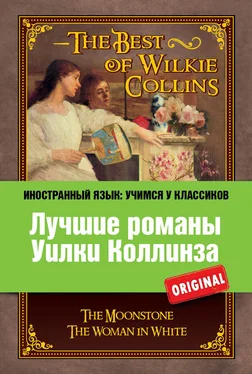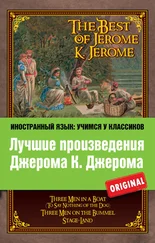The sand-hills here run down to the sea, and end in two spits of rock jutting out opposite each other, till you lose sight of them in the water. One is called the North Spit, and one the South. Between the two, shifting backwards and forwards at certain seasons of the year, lies the most horrible quicksand [18]on the shores of Yorkshire. At the turn of the tide, something goes on in the unknown deeps below, which sets the whole face of the quicksand shivering and trembling in a manner most remarkable to see, and which has given to it, among the people in our parts, the name of the Shivering Sand. A great bank, half a mile out, nigh the mouth of the bay, breaks the force of the main ocean coming in from the offing. Winter and summer, when the tide flows over the quicksand, the sea seems to leave the waves behind it on the bank, and rolls its waters in smoothly with a heave, and covers the sand in silence. A lonesome and a horrid retreat, I can tell you! No boat ever ventures into this bay. No children from our fishing-village, called Cobb’s Hole, ever come here to play. The very birds of the air, as it seems to me, give the Shivering Sand a wide berth. That a young woman, with dozens of nice walks to choose from, and company to go with her, if she only said “Come!” should prefer this place, and should sit and work or read in it, all alone, when it’s her turn out, I grant you, passes belief. It’s true, nevertheless, account for it as you may, that this was Rosanna Spearman’s favourite walk, except when she went once or twice to Cobb’s Hole, to see the only friend she had in our neighbourhood, of whom more anon. It’s also true that I was now setting out for this same place, to fetch the girl in to dinner, which brings us round happily to our former point, and starts us fair again on our way to the sands.
I saw no sign of the girl in the plantation. When I got out, through the sand-hills, on to the beach, there she was, in her little straw bonnet, and her plain grey cloak that she always wore to hide her deformed shoulder as much as might be – there she was, all alone, looking out on the quicksand and the sea.
She started when I came up with her, and turned her head away from me. Not looking me in the face being another of the proceedings, which, as head of the servants, I never allow, on principle, to pass without inquiry – I turned her round my way, and saw that she was crying. My bandanna handkerchief – one of six beauties given to me by my lady – was handy in my pocket. I took it out, and I said to Rosanna, “Come and sit down, my dear, on the slope of the beach along with me. I’ll dry your eyes for you first, and then I’ll make so bold as to ask what you have been crying about.”
When you come to my age, you will find sitting down on the slope of a beach a much longer job than you think it now. By the time I was settled, Rosanna had dried her own eyes with a very inferior handkerchief to mine – cheap cambric [19]. She looked very quiet, and very wretched; but she sat down by me like a good girl, when I told her. When you want to comfort a woman by the shortest way, take her on your knee. I thought of this golden rule. But there! Rosanna wasn’t Nancy, and that’s the truth of it!
“Now, tell me, my dear,” I said, “what are you crying about?”
“About the years that are gone, Mr. Betteredge,” says Rosanna quietly. “My past life still comes back to me sometimes.”
“Come, come, my girl,” I said, “your past life is all sponged out. Why can’t you forget it?”
She took me by one of the lappets of my coat. I am a slovenly old man, and a good deal of my meat and drink gets splashed about on my clothes. Sometimes one of the women, and sometimes another, cleans me of my grease. The day before, Rosanna had taken out a spot for me on the lappet of my coat, with a new composition, warranted to remove anything. The grease was gone, but there was a little dull place left on the nap of the cloth where the grease had been. The girl pointed to that place, and shook her head.
“The stain is taken off,” she said. “But the place shows, Mr. Betteredge – the place shows!”
A remark which takes a man unawares by means of his own coat is not an easy remark to answer. Something in the girl herself, too, made me particularly sorry for her just then. She had nice brown eyes, plain as she was in other ways – and she looked at me with a sort of respect for my happy old age and my good character, as things for ever out of her own reach, which made my heart heavy for our second housemaid. Not feeling myself able to comfort her, there was only one other thing to do. That thing was – to take her in to dinner.
“Help me up,” I said. “You’re late for dinner, Rosanna – and I have come to fetch you in.”
“You, Mr. Betteredge!” says she.
“They told Nancy to fetch you,” I said. “But thought you might like your scolding better, my dear, if it came from me.”
Instead of helping me up, the poor thing stole her hand into mine, and gave it a little squeeze. She tried hard to keep from crying again, and succeeded – for which I respected her. “You’re very kind, Mr. Betteredge,” she said. “I don’t want any dinner to-day – let me bide a little longer here.”
“What makes you like to be here?” I asked. “What is it that brings you everlastingly to this miserable place?”
“Something draws me to it,” says the girl, making images with her finger in the sand. “I try to keep away from it, and I can’t. Sometimes,” says she in a low voice, as if she was frightened at her own fancy, “sometimes, Mr. Betteredge, I think that my grave is waiting for me here.”
“There’s roast mutton and suet-pudding waiting for you!” says I. “Go in to dinner directly. This is what comes, Rosanna, of thinking on an empty stomach!” I spoke severely, being naturally indignant (at my time of life) to hear a young woman of five-and-twenty talking about her latter end!
She didn’t seem to hear me: she put her hand on my shoulder, and kept me where I was, sitting by her side.
“I think the place has laid a spell on me,” she said. “I dream of it night after night; I think of it when I sit stitching at my work. You know I am grateful, Mr. Betteredge – you know I try to deserve your kindness, and my lady’s confidence in me. But I wonder sometimes whether the life here is too quiet and too good for such a woman as I am, after all I have gone through, Mr. Betteredge – after all I have gone through. It’s more lonely to me to be among the other servants, knowing I am not what they are, than it is to be here. My lady doesn’t know, the matron at the reformatory doesn’t know, what a dreadful reproach honest people are in themselves to a woman like me. Don’t scold me, there’s a dear good man. I do my work, don’t I? Please not to tell my lady I am discontented – I am not. My mind’s unquiet, sometimes, that’s all.” She snatched her hand off my shoulder, and suddenly pointed down to the quicksand. “Look!” she said “Isn’t it wonderful? isn’t it terrible? I have seen it dozens of times, and it’s always as new to me as if I had never seen it before!”
I looked where she pointed. The tide was on the turn, and the horrid sand began to shiver. The broad brown face of it heaved slowly, and then dimpled and quivered all over. “Do you know what it looks like to ME?” says Rosanna, catching me by the shoulder again. “It looks as if it had hundreds of suffocating people under it – all struggling to get to the surface, and all sinking lower and lower in the dreadful deeps! Throw a stone in, Mr. Betteredge! Throw a stone in, and let’s see the sand suck it down!”
Here was unwholesome talk! Here was an empty stomach feeding on an unquiet mind! My answer – a pretty sharp one, in the poor girl’s own interests, I promise you! – was at my tongue’s end, when it was snapped short off on a sudden by a voice among the sand-hills shouting for me by my name. “Betteredge!” cries the voice, “where are you?” “Here!” I shouted out in return, without a notion in my mind of who it was. Rosanna started to her feet, and stood looking towards the voice. I was just thinking of getting on my own legs next, when I was staggered by a sudden change in the girl’s face.
Читать дальше
Конец ознакомительного отрывка
Купить книгу












